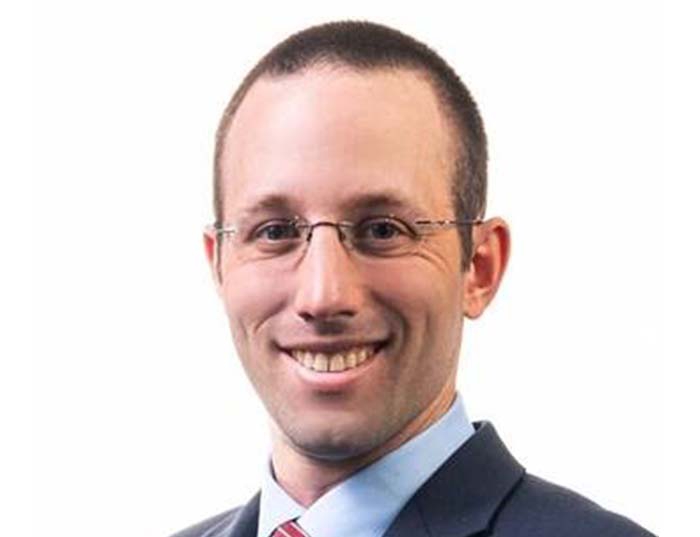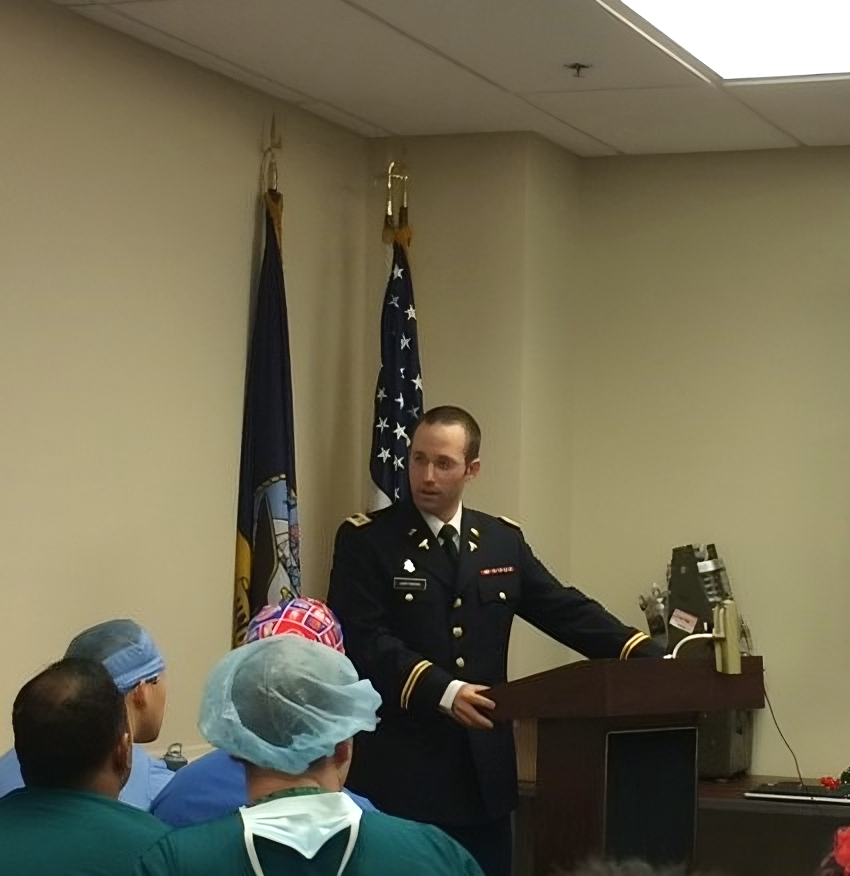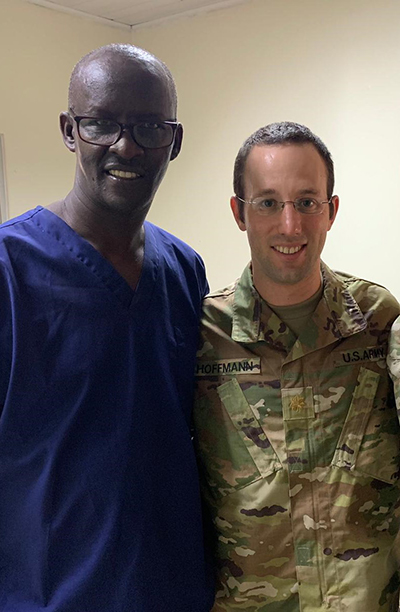 Paul Hoffmann, DO, is an anesthesiologist working at UPMC Presbyterian and UPMC Children’s Hospital of Pittsburgh. For National Veterans and Military Families Month, we asked Dr. Hoffmann to share his experiences as a Veteran and anesthesiologist.
Paul Hoffmann, DO, is an anesthesiologist working at UPMC Presbyterian and UPMC Children’s Hospital of Pittsburgh. For National Veterans and Military Families Month, we asked Dr. Hoffmann to share his experiences as a Veteran and anesthesiologist.
Please share some details about your military service and experience. In which branch of the armed forces did you serve? Where were you stationed?
I took a health professions scholarship program (HPSP) for medical school and completed my residency in anesthesiology at Walter Reed National Military Medical Center in Bethesda, MD. I was then was stationed at Ft. Bragg (now Ft. Liberty), NC before leaving active duty and returning to Pittsburgh.
What motivated you to join the military, and how did your service shape your values and perspective on life?
The ability to serve a cause and purpose bigger than oneself was a big motivating factor. The privilege to care for the men and women who go into harm’s way to defend America is an honor I will never take for granted. My military service helped shape the values of duty, service, respect, and integrity in my life.
 What have you enjoyed most about serving in the military? Can you share some of your most memorable experiences or moments from your time in the military, and how they have impacted your life?
What have you enjoyed most about serving in the military? Can you share some of your most memorable experiences or moments from your time in the military, and how they have impacted your life?
The best moments I’ve experienced in the military surround working with the many selfless, caring, professional men and women who chose to serve the needs of the country. These individuals sacrificed many things, including money, time with family and friends, and sometimes their health to serve a greater good. These incredible men and women often put the needs of others above their own to make the world a better place.
How has your experience as a Veteran and an anesthesiologist physician shaped your approach to leading medical teams in the operating room? Can you provide an example of a situation where your military leadership skills played a crucial role in coordinating and managing a complex surgical procedure or a challenging patient case?
Perhaps the biggest impact my time as a military officer has had on my civilian life as an anesthesiologist is the ability to remain calm and collected under pressure, which is necessary in these scenarios. UPMC Presbyterian and UPMC Children’s hospitals are both level I trauma centers. We care for some of the most severely injured adults and children. These patients require the simultaneous completion of life-saving tasks during surgery. The military teaches the foundation of critical thinking under duress, which is vital to mission success. Focusing on the tasks at hand in the setting of many distractions can be lifesaving. This foundation is what I build upon when leading operating room teams during the stress of emergency surgery.
In your military service, adaptability and quick decision-making were likely crucial. How do you apply these skills in your role as an anesthesiologist, especially when faced with unforeseen challenges during surgeries or in critical care settings?
The profession of anesthesiology is often one of adaptability and “in flight” decision making. Perioperative situations commonly arise and require immediate intervention. These situations can vary widely from unexpected bleeding and low blood pressure in elderly patients to breathing problems and lung maturity in babies. Anesthesiologists often think of plans A, B, C, and D just in case the clinical picture changes. Similarly, the military leader also must consider contingencies and unexpected situations when leading troops. In both situations, failure can have life threatening consequences.
Military service often emphasizes a commitment to the well-being of others. How has your sense of duty and commitment from your military experience translated into your approach to patient care as an anesthesiologist?
The military instills an attitude of selfless service to others. This mindset is essential to the success of soldiers when navigating stressful environments both at home and abroad. As anesthesiologists, we have a duty to safely shepherd a patient through their perioperative experience. I use the word “perioperative” deliberately, as an anesthesiologist’s commitment to patients is not just in the operating room. We are tasked with ensuring patients are medically optimized for their surgery, which we do in our Center for Perioperative Care. Once surgery is complete, we care for patients postoperatively, whether that be in the ICU with our critical care anesthesiologists or in our Acute Interventional Perioperative Pain Service (AIPPS) to manage postoperative pain.
 Teamwork is a crucial aspect of both military service and medical practice. How do you foster collaboration and effective communication within your anesthesia team? Can you provide an example of a successful interdisciplinary collaboration that positively impacted patient outcomes, drawing on your experiences both in the military and as a physician?
Teamwork is a crucial aspect of both military service and medical practice. How do you foster collaboration and effective communication within your anesthesia team? Can you provide an example of a successful interdisciplinary collaboration that positively impacted patient outcomes, drawing on your experiences both in the military and as a physician?
We hear it all the time throughout society how communication issues result in bad outcomes. In medicine, effective team communication is fundamental to patient success. During surgery, many different operative personnel are often performing tasks simultaneously. One situation that comes to mind is when I administered anesthesia on a premature infant with severe lung disease undergoing a tracheostomy. I had numerous discussions with the ENT surgeon and neonatologist prior to surgery to ensure the infant was stable and that the surgery was necessary for ongoing care. The anesthesiology resident and I then developed a plan with contingency options. The team performed the delicate surgery, and the baby did well. Each team member brought a unique perspective and knowledge base to the child, and combined we were able to successfully care for the critically ill infant.
Veterans often bring a unique perspective to problem-solving. How do you approach problem-solving in your role as an anesthesiologist, and are there specific methodologies or strategies from your military service that you find particularly useful in addressing complex medical issues or optimizing patient care?
Problem solving in the military has been taught with a wide variety of techniques. One technique is to break down a scenario into “critical points.” During a military mission, these critical points can cause mission success or failure. Anesthesiologists often encounter “critical points” during surgeries, where a bad outcome at that specific time can have terrible consequences. We then formulate a plan to navigate these critical points in such a way to allow for the highest chance of success, even when unexpected events occur.
How do you think society can better support and appreciate the contributions of Veterans, especially during National Veterans and Military Families Month?
I have never been to a war zone, but I have taken care of many soldiers who have. Long after the visible wounds of war have healed, many service members and their families suffer from mental health diseases. The public may see a service member doing well, but in private, that same person may be suffering greatly. I encourage society to improve the mental health care of our service men and women so they can continue to lead productive lives after their military service has ended.
Looking back on your military service, what are you most proud of, and is there anything you wish civilians better understood about the experiences of Veterans?
My military experience was certainly not as long as that of many others who have devoted their professional careers to the armed services. However, what brings a smile to my face is knowing I was part of a larger group of individuals tasked with taking care of American men and women who chose to go into harm’s way to protect the freedoms we enjoy on a daily basis. Many service members have sacrificed a lot to protect our way of life. It’s important to care for those individuals after they have given so much to us.
